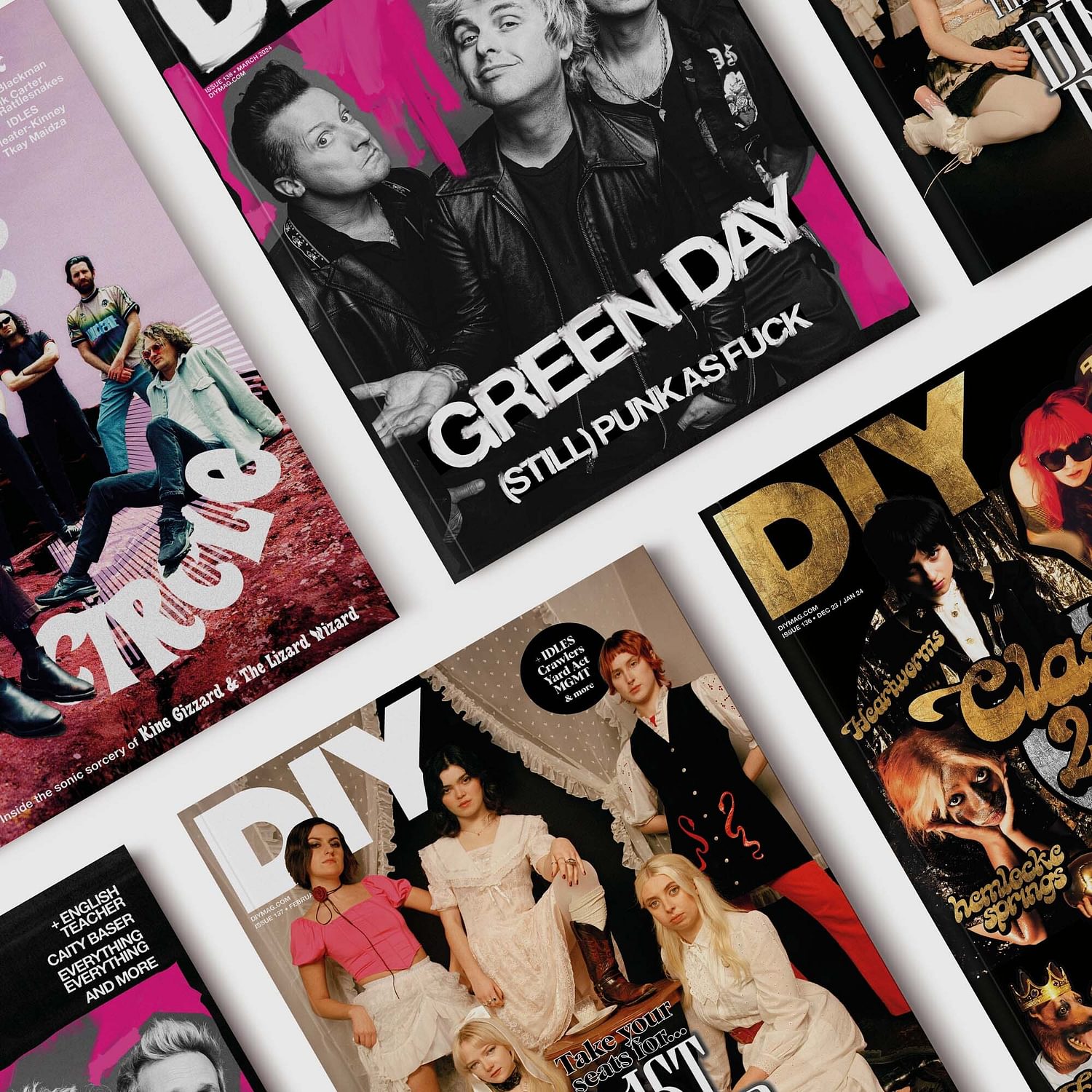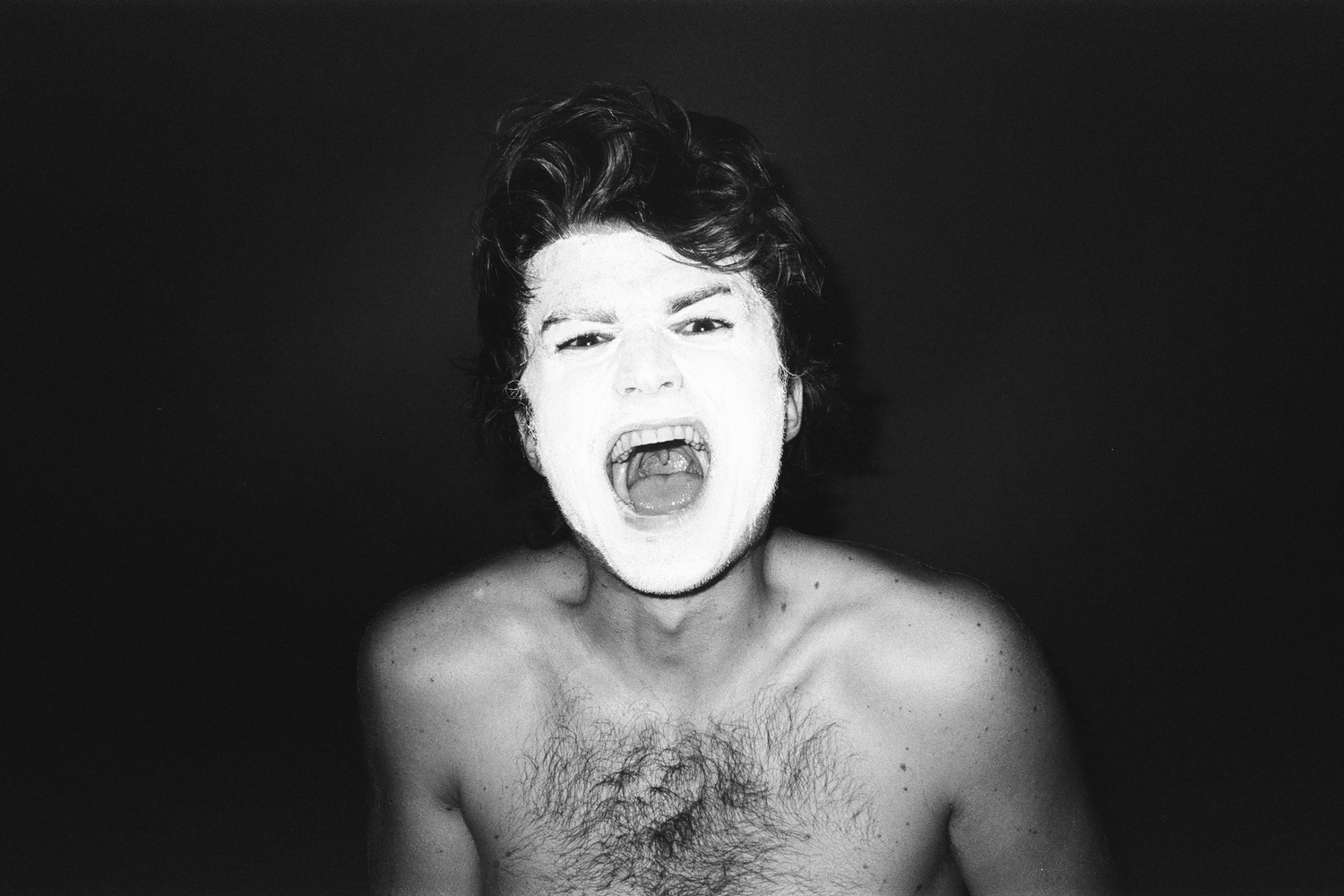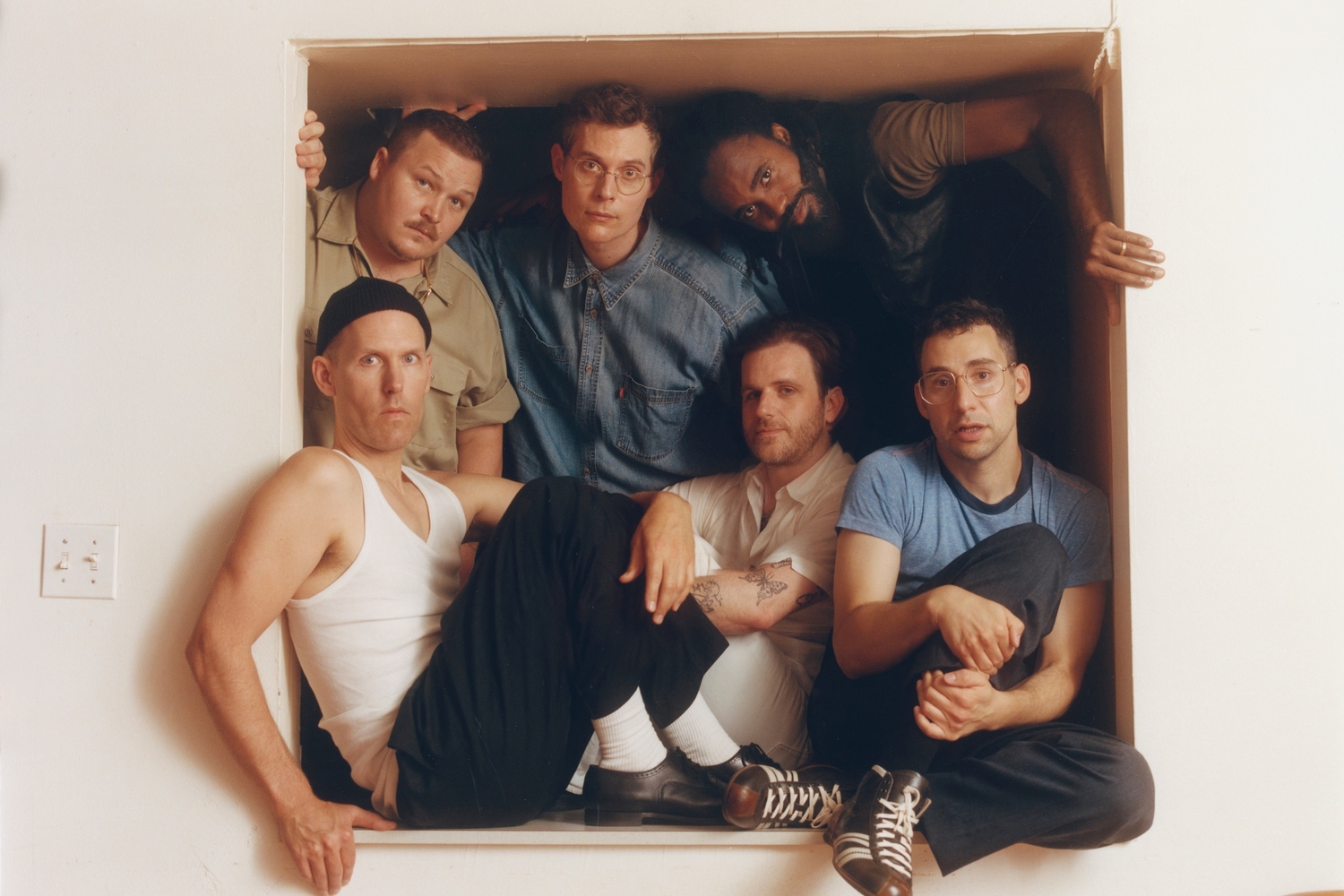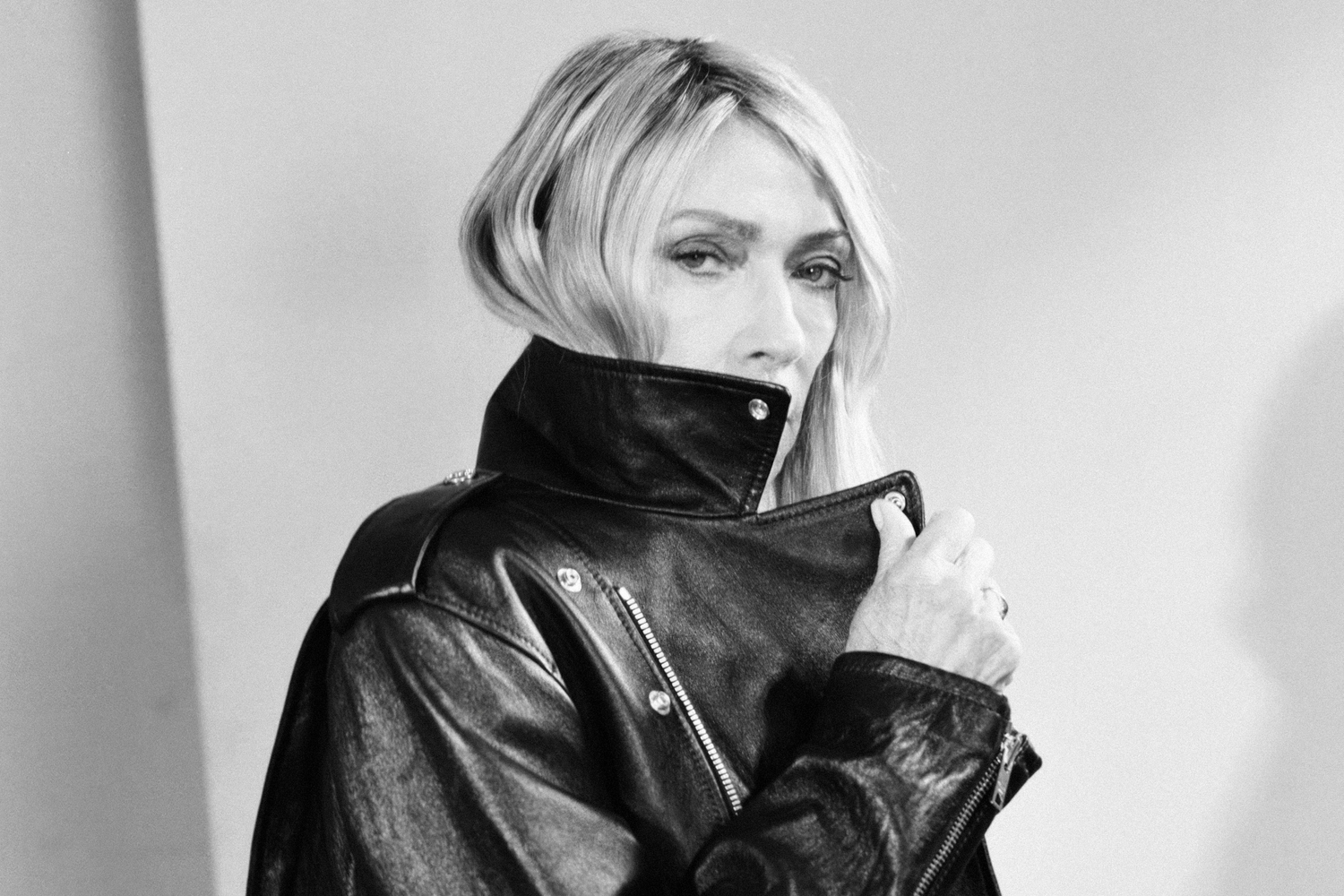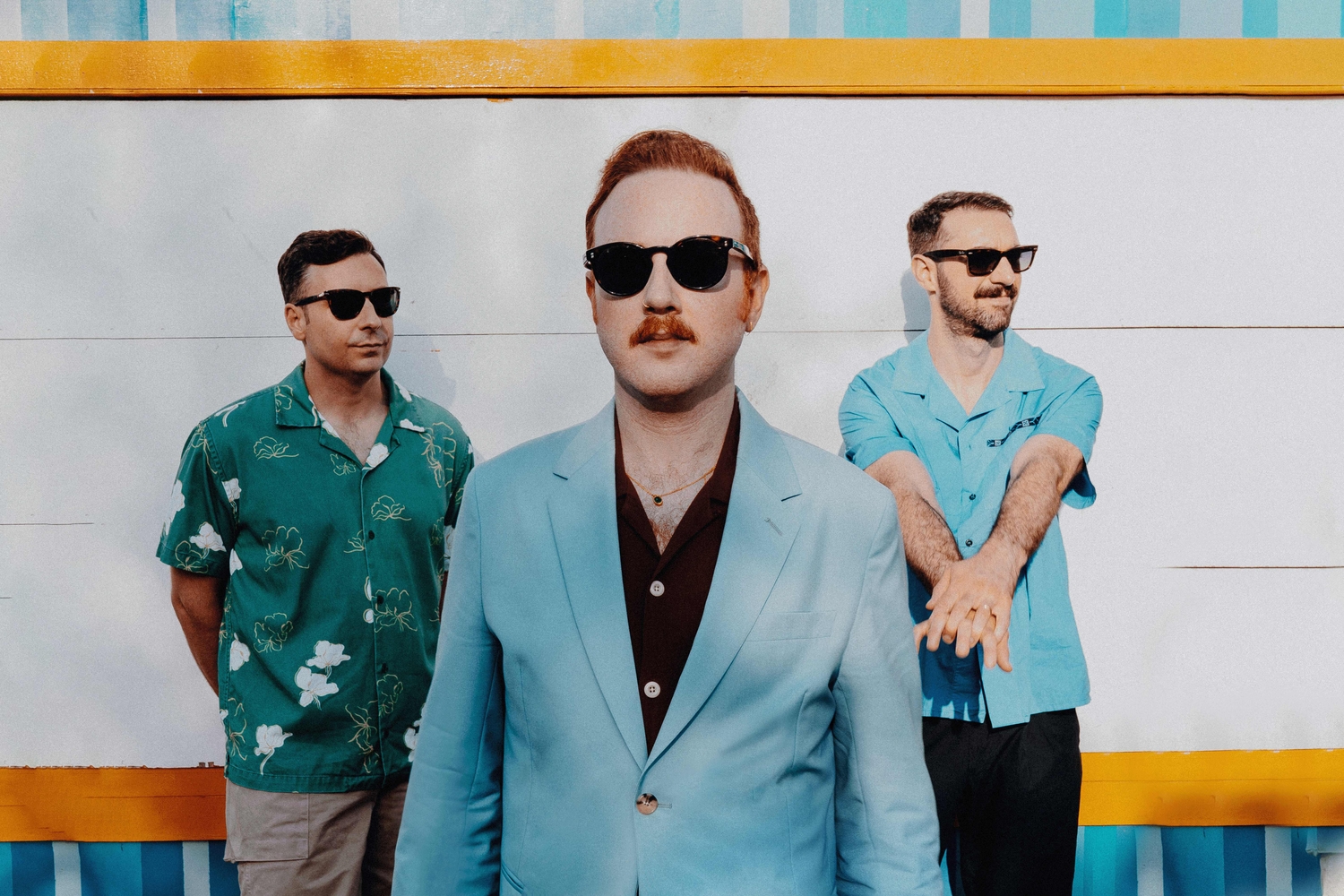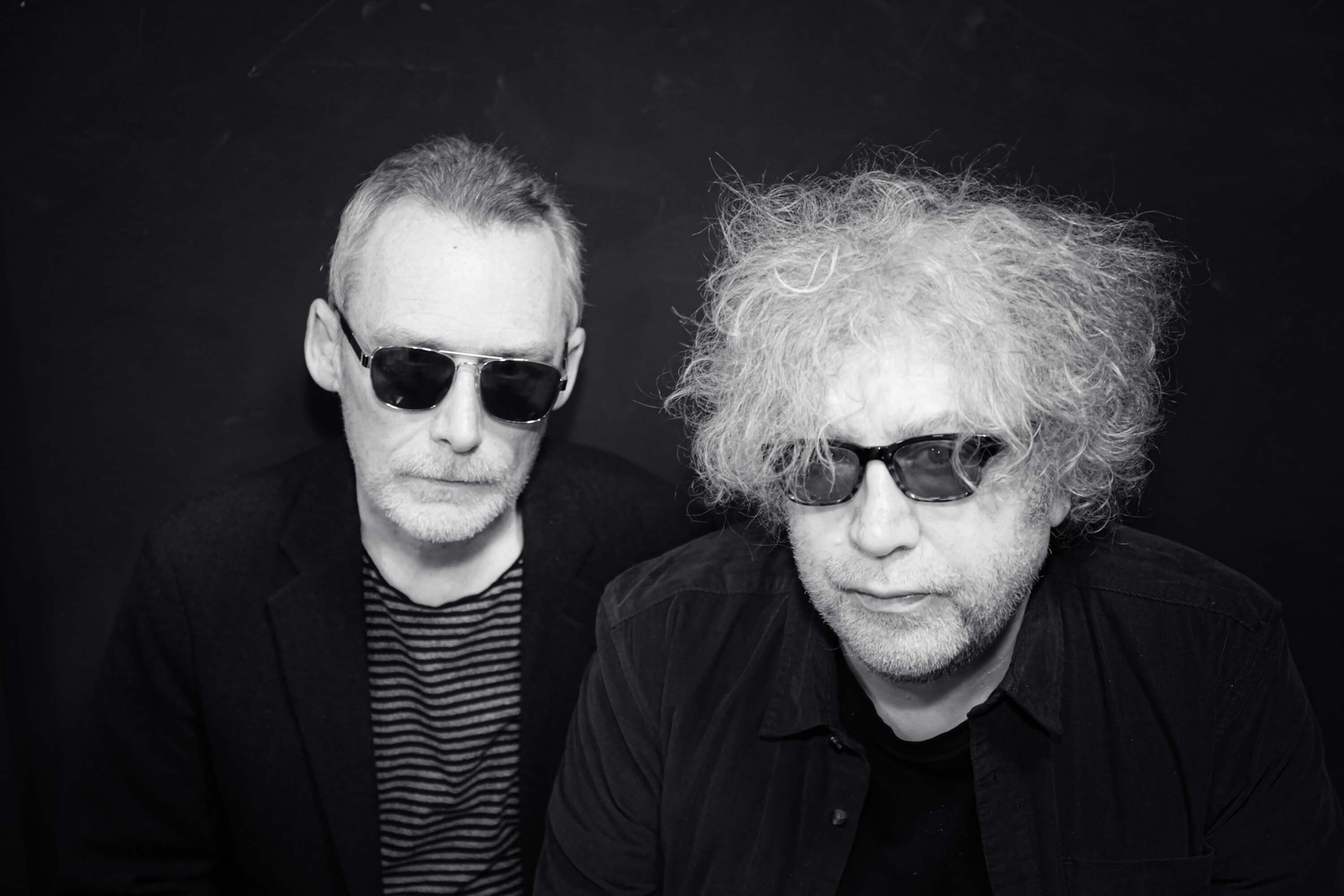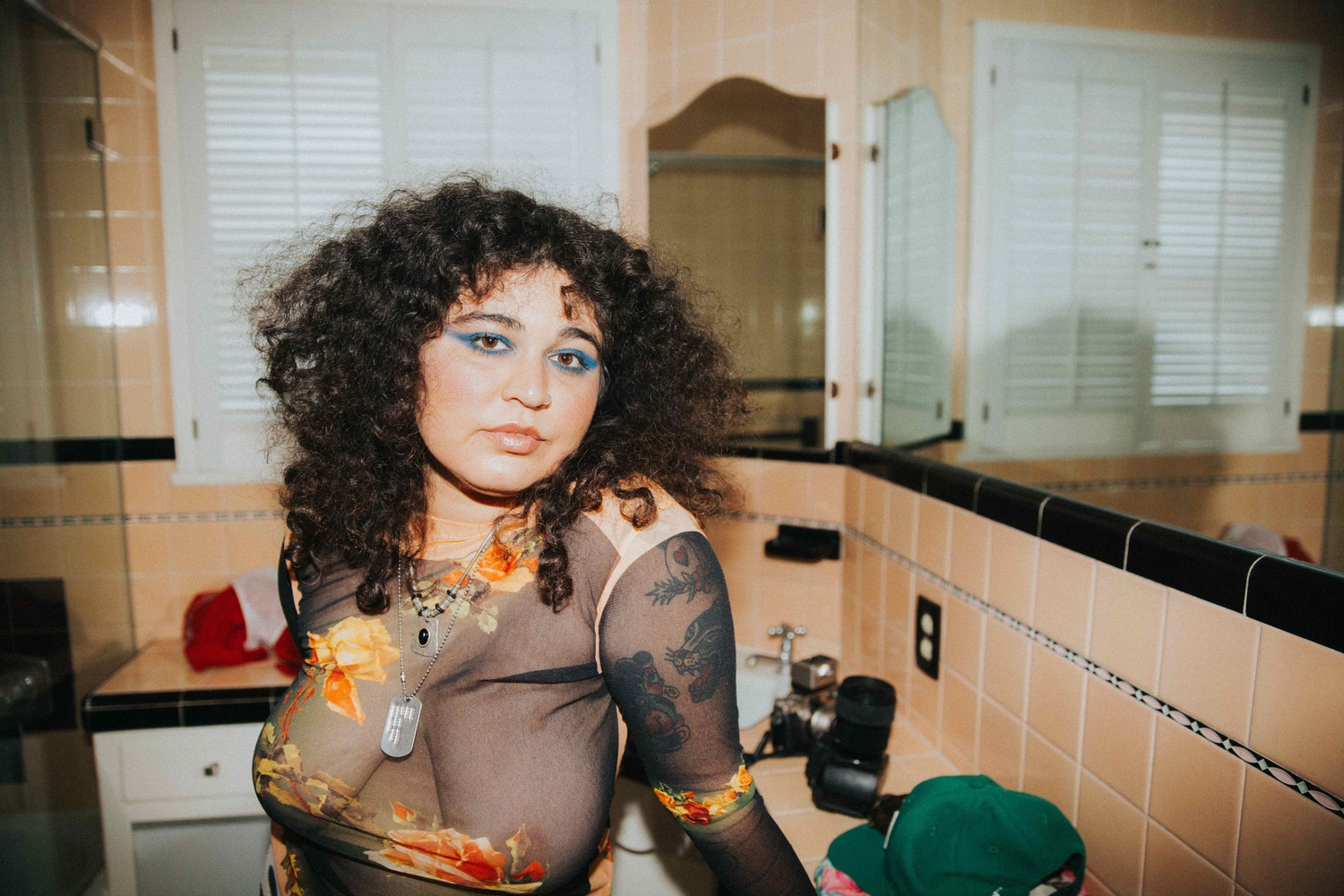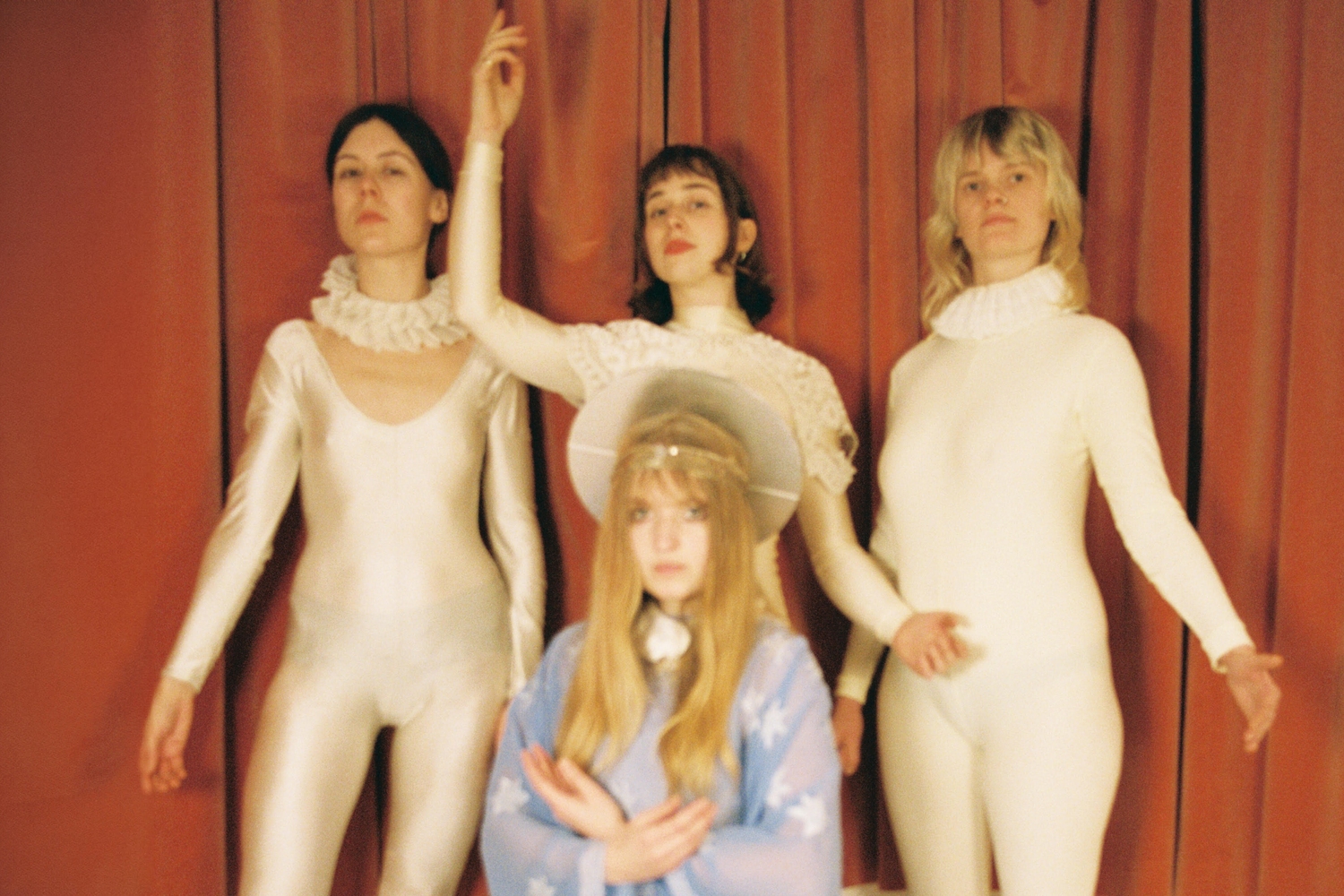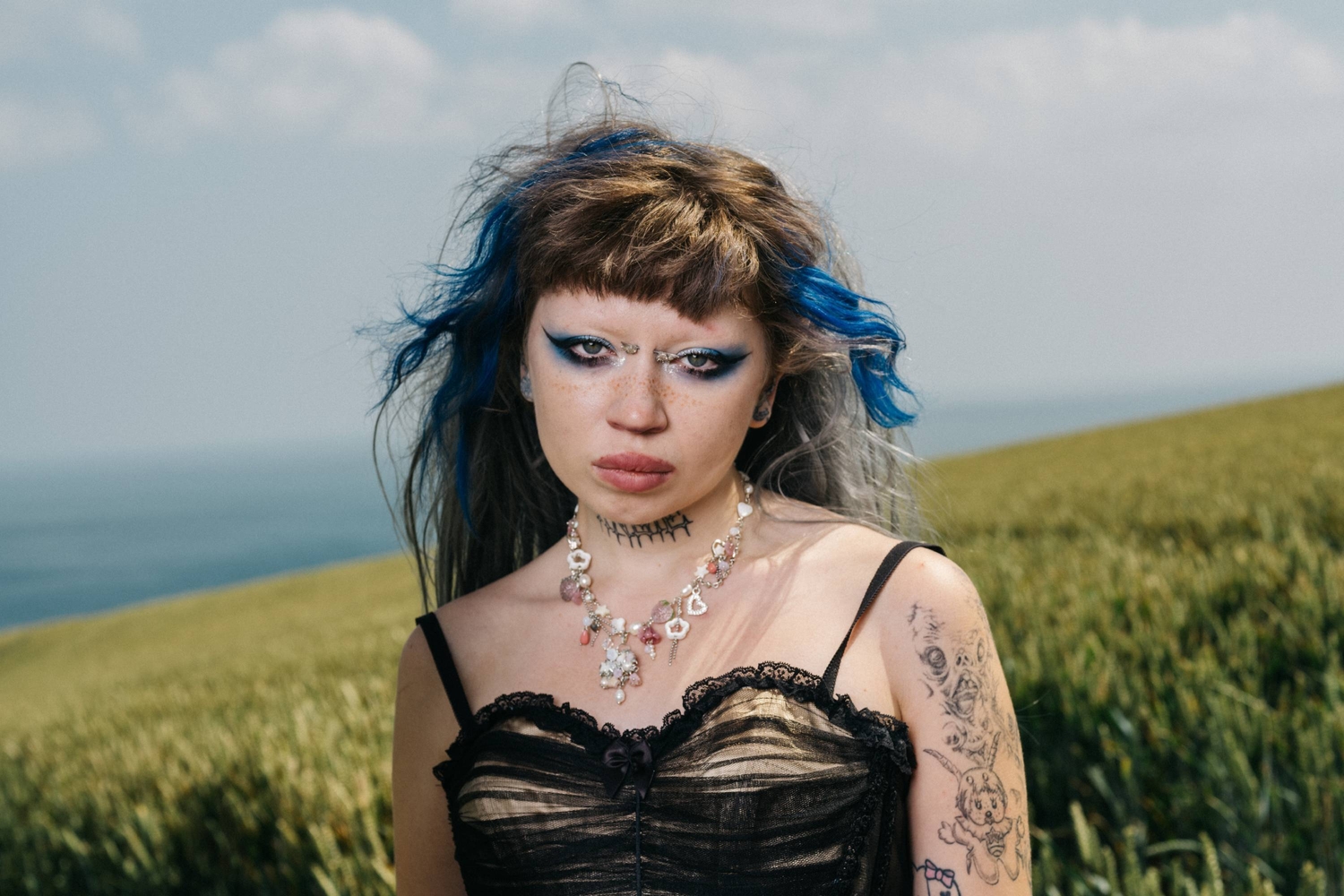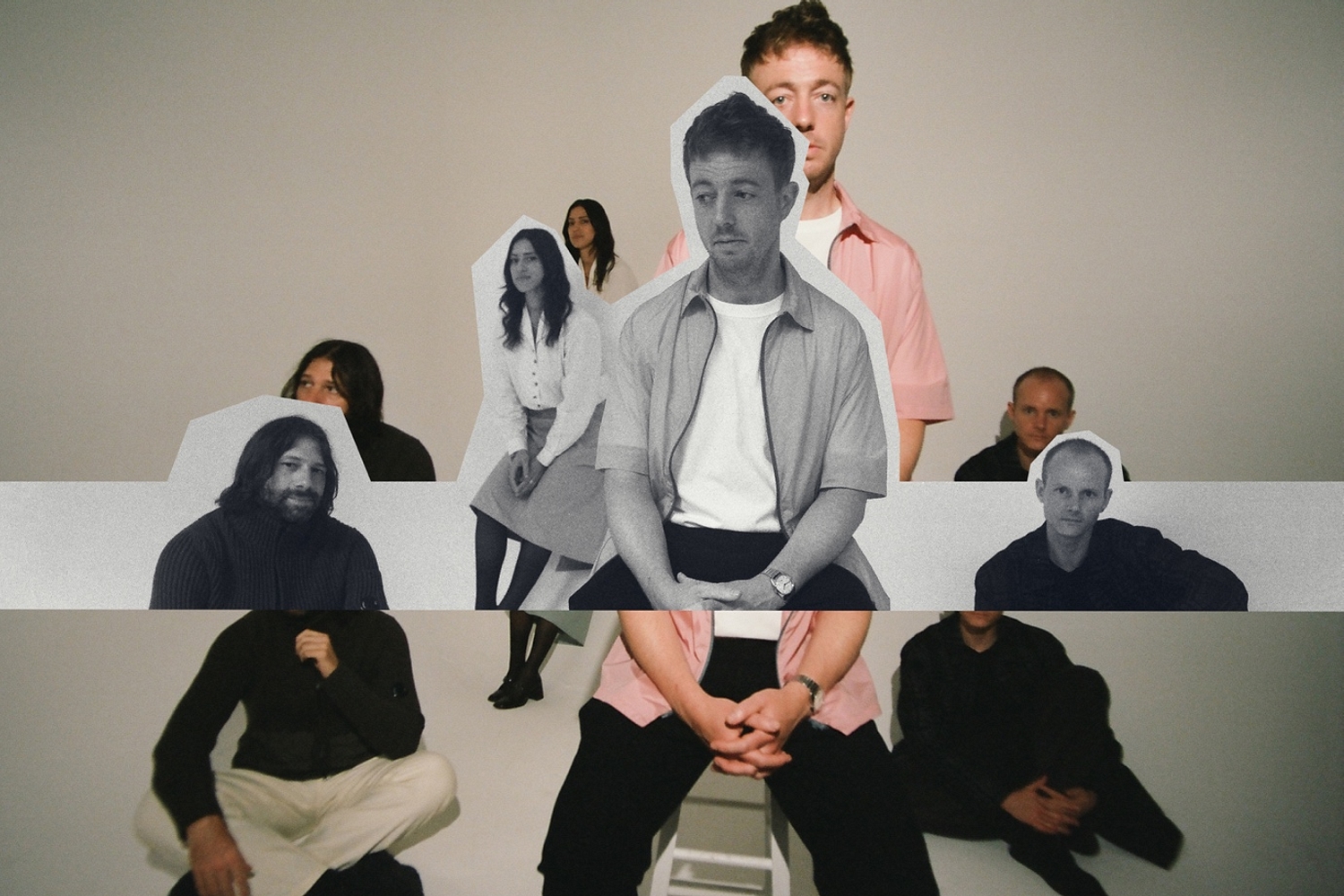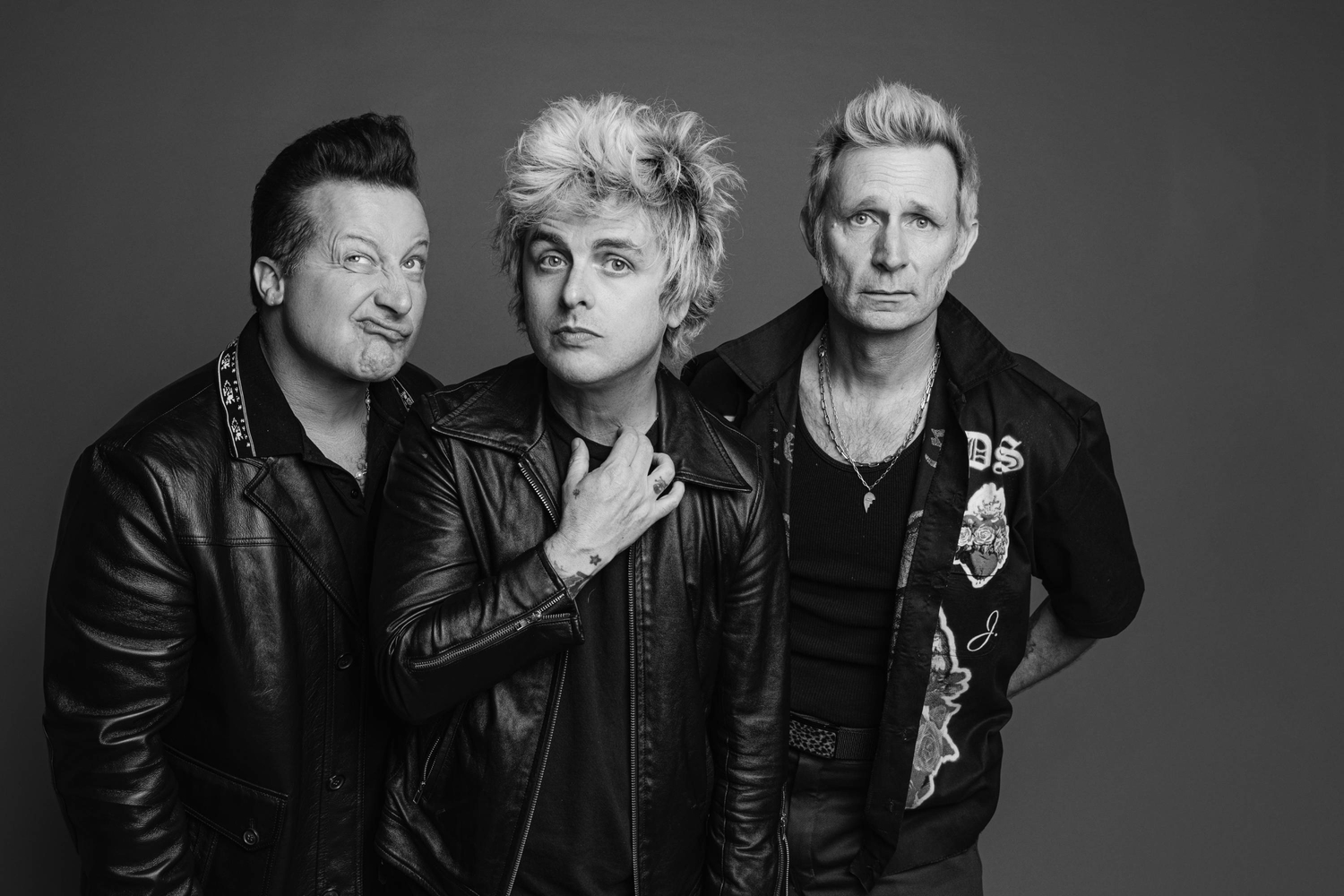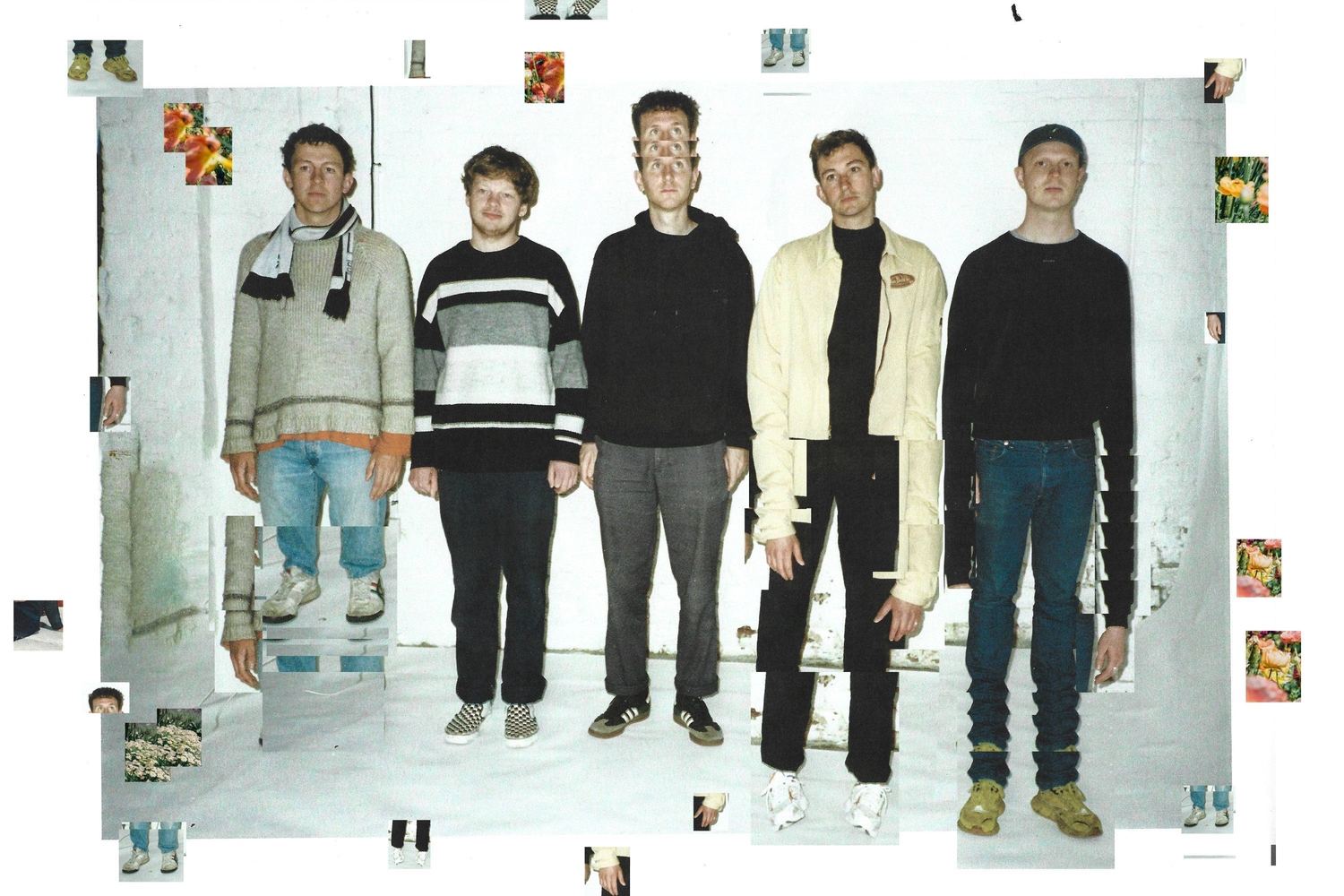
Cover Feature Grand Designs: Squid
With sold-out tours and a Top Five debut album, Squid transcended the post-punk revival and became a unique powerhouse. On second album ‘O Monolith’, the irresistibly restless quintet are looking to the natural world to continue their evolution.
“We just start on a path each day,” Squid’s Arthur Leadbetter tells DIY of the band’s creative process, as if beginning a grand and triumphant story plucked from The Lord Of The Rings. “We come into the studio, and sometimes you get into the Squidmobile and it’s going really, really quickly, and you don’t know where it’s gonna go, and it’s really fun. Other times, it’s just chugging along in first gear, and you don’t really go anywhere. That’s the journey.”
To know how the multi-instrumentalist got to this brilliantly barmy story is to understand the delightful duality at the heart of Squid. A few moments earlier, he was singing the praises of the Fairlight, a little-used but hugely influential digital synthesiser and sampler created in 1979, that the band were able to get their hands on when recording their fantastic second album, ‘O Monolith’. Cut a few seconds forward, and we’re onto an analogy that seems more Scooby Doo than Serious Muso Band.
Across our conversation, the five-piece – who were largely based in Bristol when making this album but are now scattered across the UK – veer without warning from discussing the introduction of complex rhythmic patterns, to their writing process, to how Arthur once lost a friend’s birth certificate while pissed at Boomtown. Though Squid take their work and their music hyper-seriously, nothing is too important to take the piss out of, and this meshing of high and low culture - with no compromise on either end - is what gives them such a unique voice. To prove the point, ‘O Monolith’ contains a song about Edgar Allen Poe. It’s followed immediately by one concerning the wedding of one of the Loose Women. The band evidently take equal delight in both.
The route to Squid’s anticipated second album has been one equally cut to their own mould. After forming in 2016, the then-Brighton band shared a number of slow-burn singles before solidifying their promise with 2018 track ‘The Dial’, shared as part of Speedy Wunderground’s hugely influential singles series. Soon after, ‘Houseplants’ followed, with its esoteric lyrics, yelped vocals and skittish post-punk instrumentals finding a home on the BBC Radio 6 Music playlist and in the more experimental corners of UK festival line-ups.
By the time they released debut album ‘Bright Green Field’ in May 2021, Squid had evolved several times over, shedding old skins as quickly as they could release music. As ‘The Dial’ began reaching a wider audience, it was already being phased out of their live sets, while fans still shout for ‘Houseplants’ at gigs now even though the band retired it three years ago. Even when ‘Bright Green Field’ went Top Five in the UK album charts, it emboldened Squid to evolve once again on its follow-up rather than feel beholden to the style that had given them success.
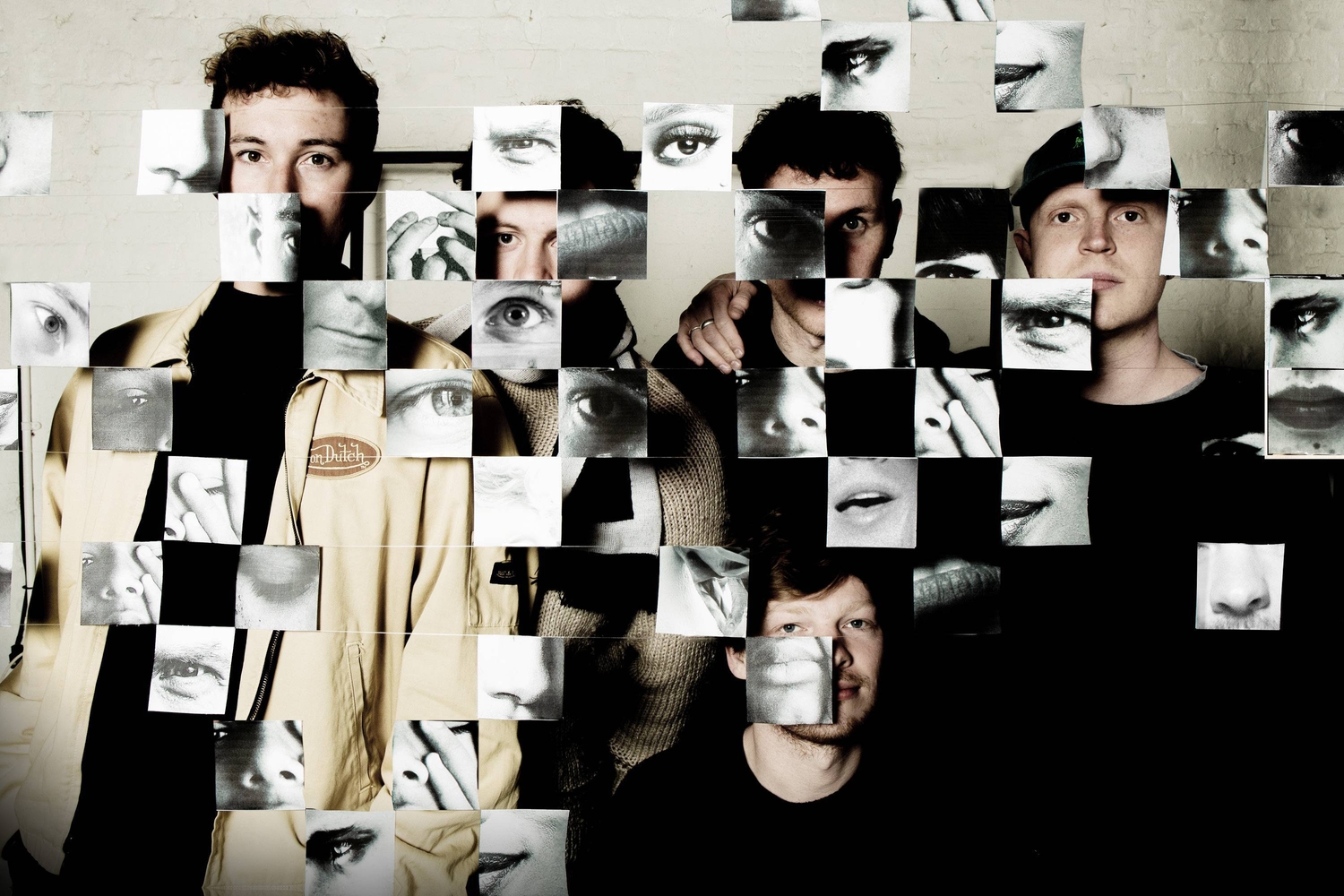
On ‘O Monolith’, they stretch their sonic remit further and wider, finding new, more expansive soundscapes and swerving away from the post-punk formula that they had become known for. While all the idiosyncrasies of the Squid we know remain, they emerge in more unusual shapes, via instrumentation that’s more intricate and often quieter. First single and album opener ‘Swing (In A Dream)’ is a swirling beast that packs plenty of punch, but doesn’t work towards a crescendo like ‘Bright Green Field’ opener ‘Narrator’, or rely on any formula they’ve already perfected. Instead, it feels deliciously new.
No version of Squid is ever the finished article, and the most exciting idea is always the next one, the band say. “When the oldest songs were written, we all had the mindset of, ‘Oh, this is a fun thing to do in the evenings, play some gigs and hang out’,” drummer and singer Ollie Judge reflects now. “I don’t think any of us thought we’d have to think about those songs in five years’ time, and whether or not we play them live.
“You just grow out of some things, and I just don’t feel as connected to older songs,” he adds. “It’s like the Radiohead thing with ‘Creep’. I don’t think five middle-aged men really like playing that song anymore, and I can kind of get that now.”
True to this manifesto, Squid are perpetually one step ahead, with the next idea always being cooked up behind the scenes. This future-facing raison d’être was shown best the week ‘Bright Green Field’ was released, when the band began a socially distanced UK tour they dubbed ‘Fieldworks’, featuring work-in-progress material from what would become ‘O Monolith’. "There’s no point just waiting for an album to come out and finishing that whole process before starting new things,” guitarist Louis Borlase says in a matter-of-fact tone. “You’ve got to be proactive, and to keep that creative momentum going and get ideas out while they’re still fresh.”
On the ‘Fieldworks’ tour, the band visited 17 towns across the UK, often playing two gigs in an evening, and treated the seated audiences to a peek inside their creative process. Sketches of songs now heard on ‘O Monolith’ were presented in instrumental form and workshopped in unusual and unique venues, often in towns off the beaten track of the toilet circuit. In London, they played two shows at the Silver Building in the Docklands, with the dystopian backdrop of the Greenwich cablecar peering behind the makeshift stage. Halfway through, a Deliveroo driver tip-toed between the pub benches that made up the seating area with a family’s McDonald’s order.
Though seemingly opposed to their intricate, uncompromising work ethic and creative process, allowing others to peek into their work helped Squid find a new purpose with LP2. As lockdown started to lift, they headed back to the writing room.
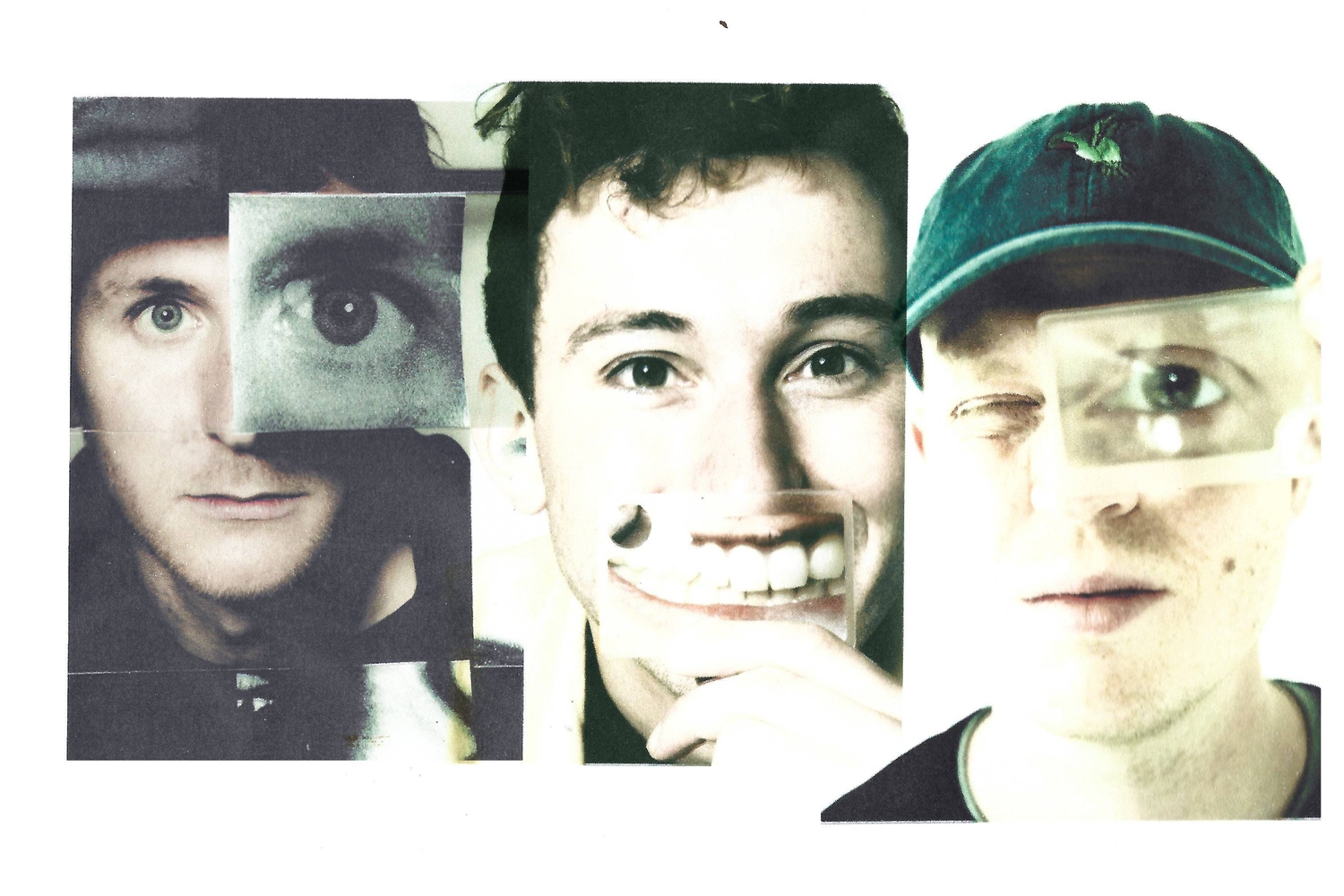
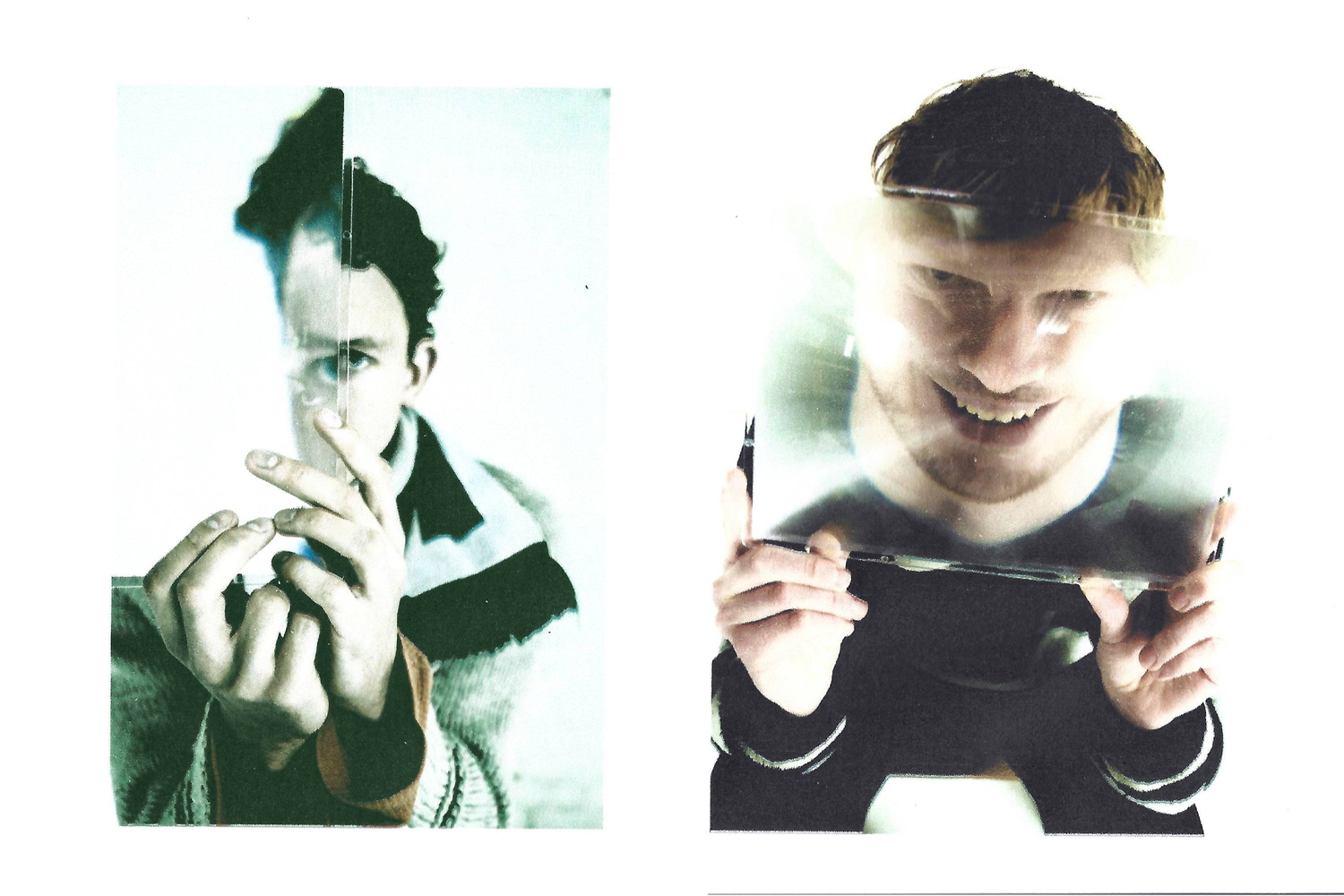
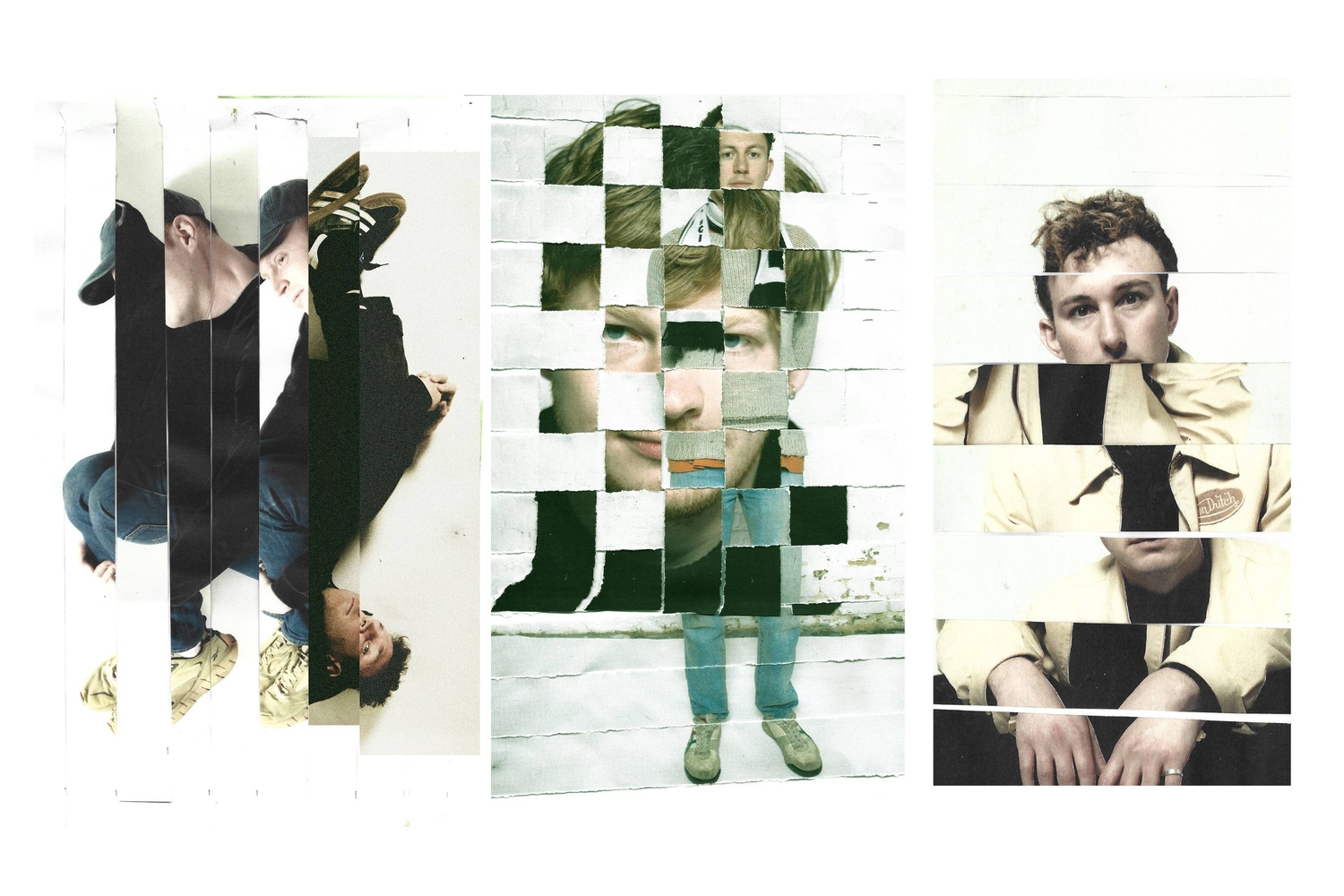
Peter Gabriel’s Real World studio is a gear nerd’s paradise. Nestled in the Wiltshire countryside a few miles from Bath, the cavernous residential building has birthed albums by The 1975 and Björk, and even hosted Beyoncé. Its Big Room feels as shiny, glossy and awe-inspiring as its name would suggest. Squid’s journey with the hallowed hall, however, began on the other side of the property in a freezing shed that doubled as their writing room.
“It’s some sort of World War Two bunker that’s ice cold all year round,” Louis remembers, almost shivering as he recalls the place that the band have chosen to work for a number of years now. “The room just sounds amazing though, and we feel really creative in that space.” With four of the five members living in Bristol at the time, and guitarist Anton Pearson in nearby Marlborough (“He couldn’t be seen dead in the same city with the other four of us!” multi-instrumentalist Laurie Nankivell laughs), the Real World writing room just down the road became their main hub as ‘O Monolith’ took shape.
Occasionally during writing sessions, Squid would take breaks and peek through the windows of the world-famous studios across the river to see which star was busy at work, making an acquaintance in Tom Jones at one point, as they giddily told DIY earlier this year. Other times, they would wander out into the blissful countryside that surrounds the studio, soaking up the deep and rich history and folklore of the area. Stonehenge isn’t far away, with the lesser-visited but equally historic stones at Avebury even nearer.
Eventually Squid graduated to Real World’s top table, entering the main studio with longtime collaborator Dan Carey, who’d helmed their debut at his comparatively tiny yet legendary studio in Streatham. “He’d just worked on the Foals record at Real World before us, so that was a good practice run for him,” Ollie laughs. “We quite often get Foals to do stuff before us just to check if it’s alright,” guitarist Anton Pearson quips. Across a fortnight in the studio, the band stretched their creative process to new limits, finding new sonic terrain and working within self-imposed limitations to hone the sound of the record more effectively. “We came up with the approach of really trying to focus on woodwind instruments,” Louis remembers, with these particular sounds offering “a suitable range of orchestration to allow the songs to develop, after their structures had been written into something that has more rhythmic complexity.”
Through complex and heavily debated decisions such as these, the band landed on a sonic palette for ‘O Monolith’ that pushes beyond the sounds presented on ‘Bright Green Field’, ensuring a feeling of reinvention and breaking rules that they previously imposed. As with Ollie’s previous ‘Creep’ analogy, Radiohead prove a suitable parallel for the ethics of Squid, as well as many of the sonic hallmarks on their second album. The criss-crossing guitars on ‘Devil’s Den’ could easily find a home on ‘In Rainbows’, as could Ollie’s distinctly Yorke-ish drawl. Elsewhere, ‘After The Flash’ is a disconcerting avant-garde stomper while single ‘Undergrowth’ is snotty and funky in equal measure. While not revolutionising themselves beyond recognition, Squid’s evolution here feels deliberate, definitive and for good reason.
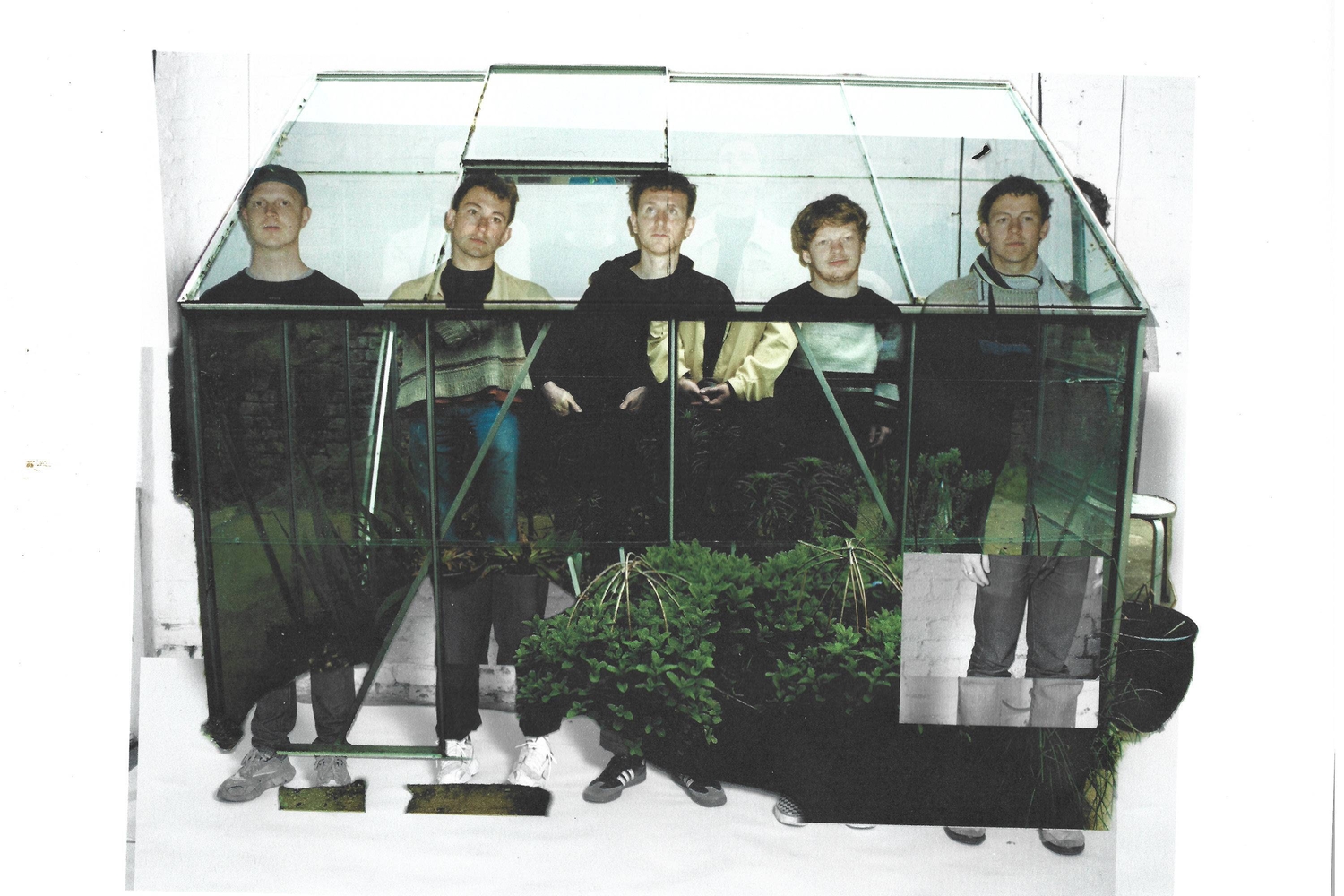
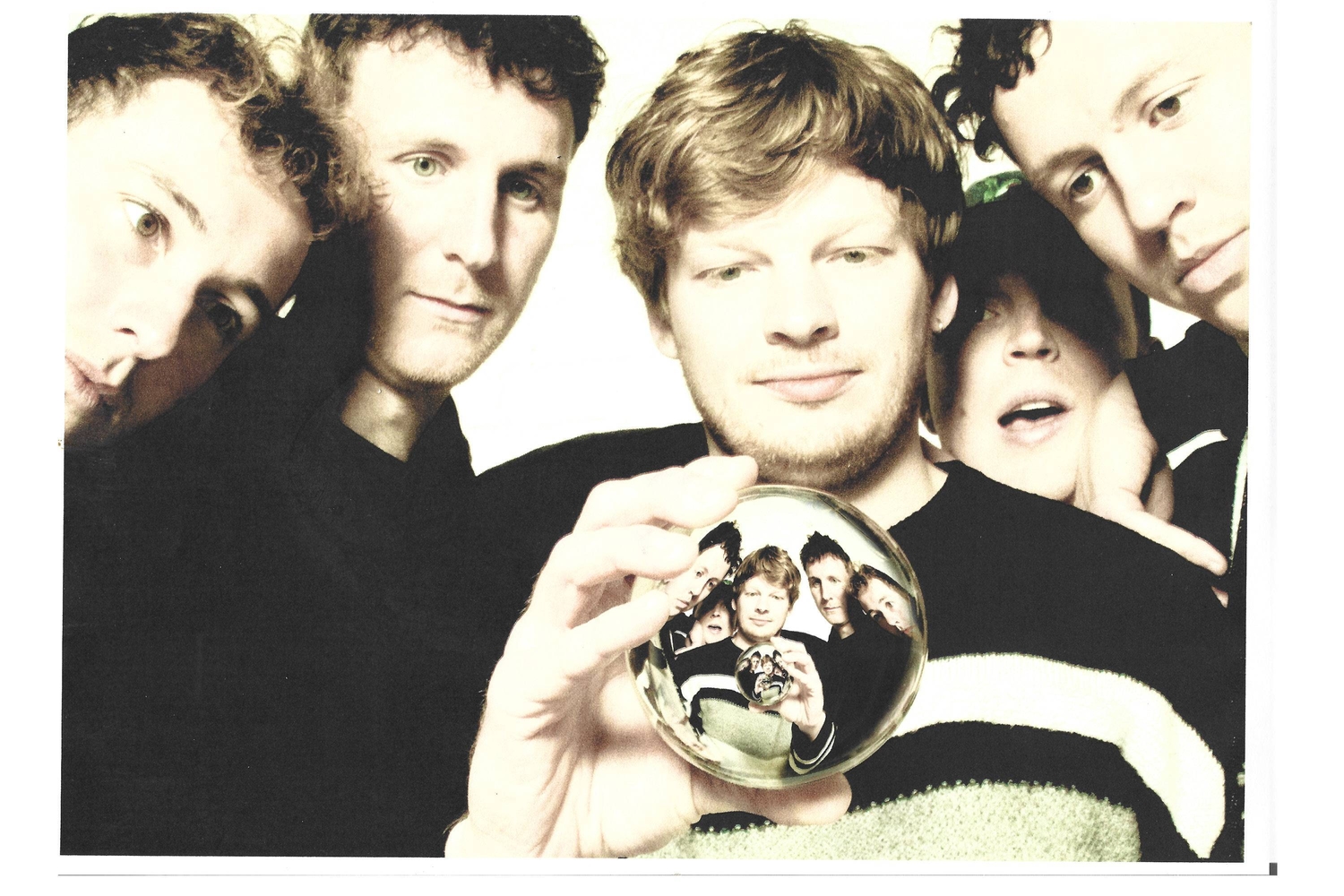
Ever the sonic scientists, Squid also used all the toys at their disposal in the playground of Real World. The most fascinating of these is the aforementioned Fairlight, which was used heavily by Kate Bush in the 1980s after she was introduced to it by Gabriel, who owns the version that Squid were given access to.
“It’s got a very, very distinctive sound, and is also very unwieldy to use,” Arthur – the instrument’s giddy main custodian – explains. “It’s like it’s from another planet, or from The Matrix. It’s just fascinating, really, when you look at it and think about how far technology has come, but how much we’ve potentially lost along the way as well. In going back to these old tools, you get some real character back into what you’re making.”
Intersecting with these unique and organic sounds are Ollie’s lyrics, which are as delightfully unusual as ever. In line with the “natural” sound the band had cultivated, Ollie set out to try and make a “lyrically spiritual” album, going on to get “really obsessed with old Japanese folktales about spirits and stuff like that.” It led him down a path towards animism, which concerns the idea that inanimate objects contain living souls. “I found it interesting to think of very British objects, like green wheelie bins, and imagine what kind of spirits would live in them,” he laughs. On ‘Undergrowth’, he imagines dying and being reborn as a bedside table.
This kind of mundanity is given a lot of weight on ‘O Monolith’, largely because it was a welcome departure from the non-stop touring the band experienced in 2019. “I was longing for the green wheelie bins,” Ollie smiles. “Longing for recycling.” Meanwhile, contrasting with the domesticity of lockdown that’s reflected in the album, the environment around Real World is also key to the album’s lyrical identity.
“Being stuck in the UK for so long, I think it definitely made me think about my surroundings a little bit differently and enjoy going out for walks and stuff,” Ollie says. “I don’t think I’d ever really done that, and the pandemic helped me realise that the UK is actually such a beautiful place.” Despite its title, the singer describes ‘Bright Green Field’ as a “claustrophobic and city-led project,” and says it was “a nice difference to focus on more pastoral things” on its follow-up. Louis adds: “I think this album is a real look at environment, and the sliding scale of environment, from the climate to your immediate surroundings.”
As well as the more organic and natural instrumentation on show, this greener and more luscious feel to the album is transmitted by Ollie’s vocals, which have transformed somewhat radically since Squid’s debut. On ‘Houseplants’ and other early tracks, he developed a signature early singing style, a distinctive kind of yelp-y shout that fitted perfectly with the band’s fidgety punk. As the rest of the music evolved though, this type of vocal delivery felt stuck in the past for the drummer.
He explains: “I wanted to sing a bit more on the album, and then we started recording it and I did a pass at vocal takes and just did the classic kind of screaming and shouting as loud as I can. It just didn’t really feel right, and so I worked quite closely with Dan getting that right. It was really, really difficult. I found it really hard.
“I got a bit of impostor syndrome, just shouting all the time, and just got a bit bored of it,” he continues.“ With the music being more melodic and softer at times, it kind of suits that. I think as a whole package, it shows a bit of progression from the last one, which is what we’re always trying to do.”
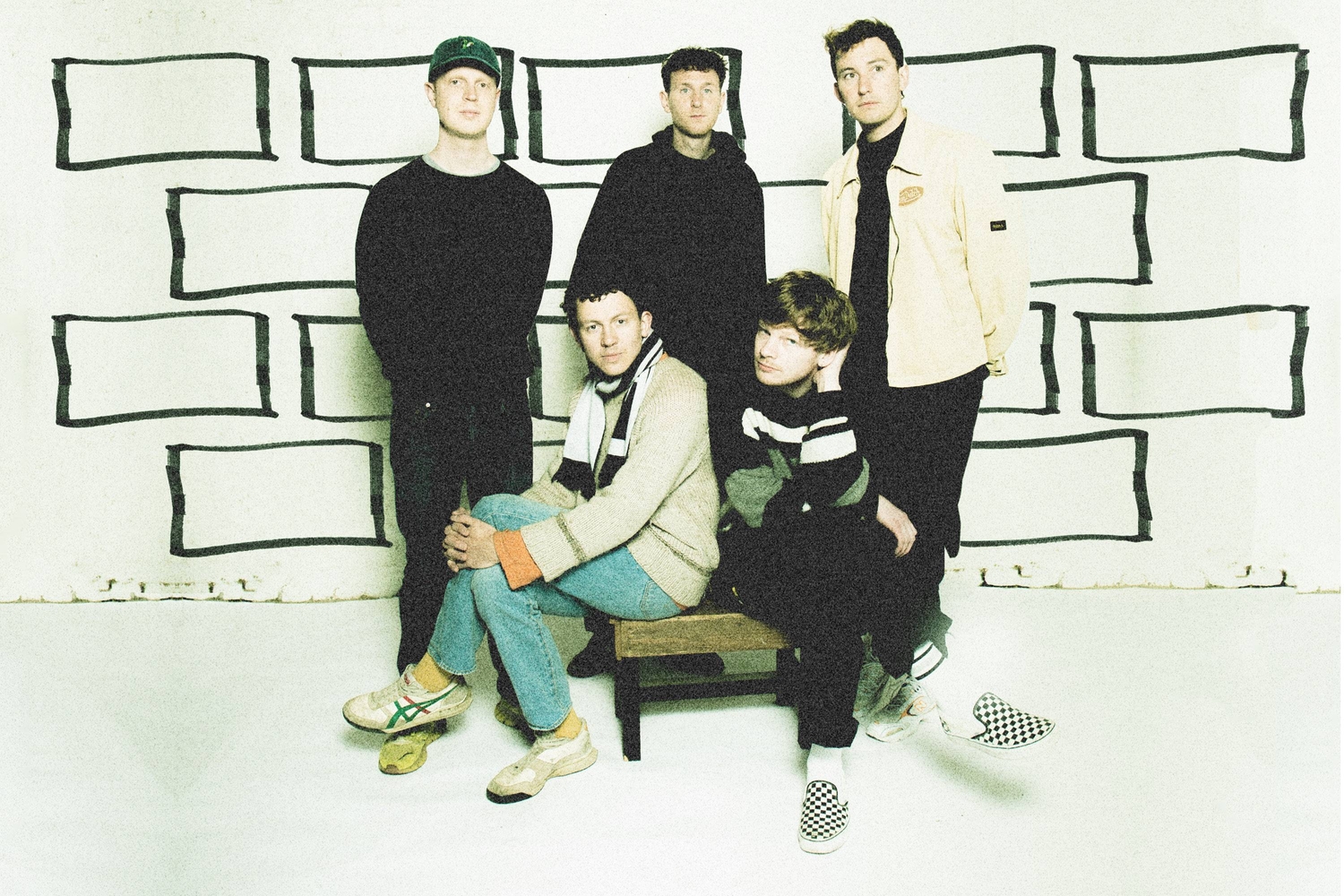
Through this change in vocal style, Ollie’s lyrics come to the fore more than ever on ‘O Monolith’. Along with dissections of British folklore and contemplating furniture having feelings, he muses on police and protests (‘The Blades’), the climate crisis (‘Swing (In A Dream)’) and other weighty topics, once again balancing the serious and the comically obscene perfectly.
“We’re lucky that we can explore all these different avenues of our minds together, because we all have quite different tastes,” Arthur says of the five-piece’s unique chemistry heading into the future. Laurie interjects: “At its worst, it feels a bit like a local council meeting where you’re discussing something like parking, and you’re all kind of on the same page but you can’t quite figure out how to implement the policy.”
...and at its best?
“A really great council meeting! You’re coming up with so many policies!” Anton adds, before each member of the band shouts in suggestions. “Ten-minute towns! Cycling infrastructure! Destroying anti-homeless architecture!”
As dedicated to nonsense as they are creative perfection, Squid are one of the most endlessly fascinating bands in the modern UK landscape. On ‘O Monolith’, they’ve taken another huge, mystifying leap forwards. Who the hell knows what’s next.
’O Monolith’ is out 9th June via Warp.
Taken from the May 2023 issue of DIY. Grab a copy of this issue now.
Squid play #mybloodyfestival (16th - 18th June), where DIY is a media partner. Head to the festival’s website for more info, and to buy tickets.
Records, etc at

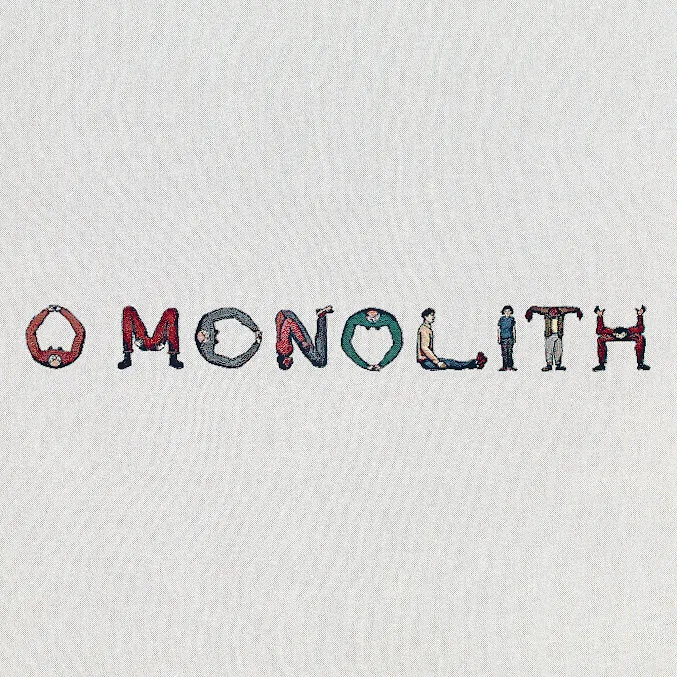
Squid - O Monolith (Vinyl LP - blue)

Squid - O Monolith (Cd)
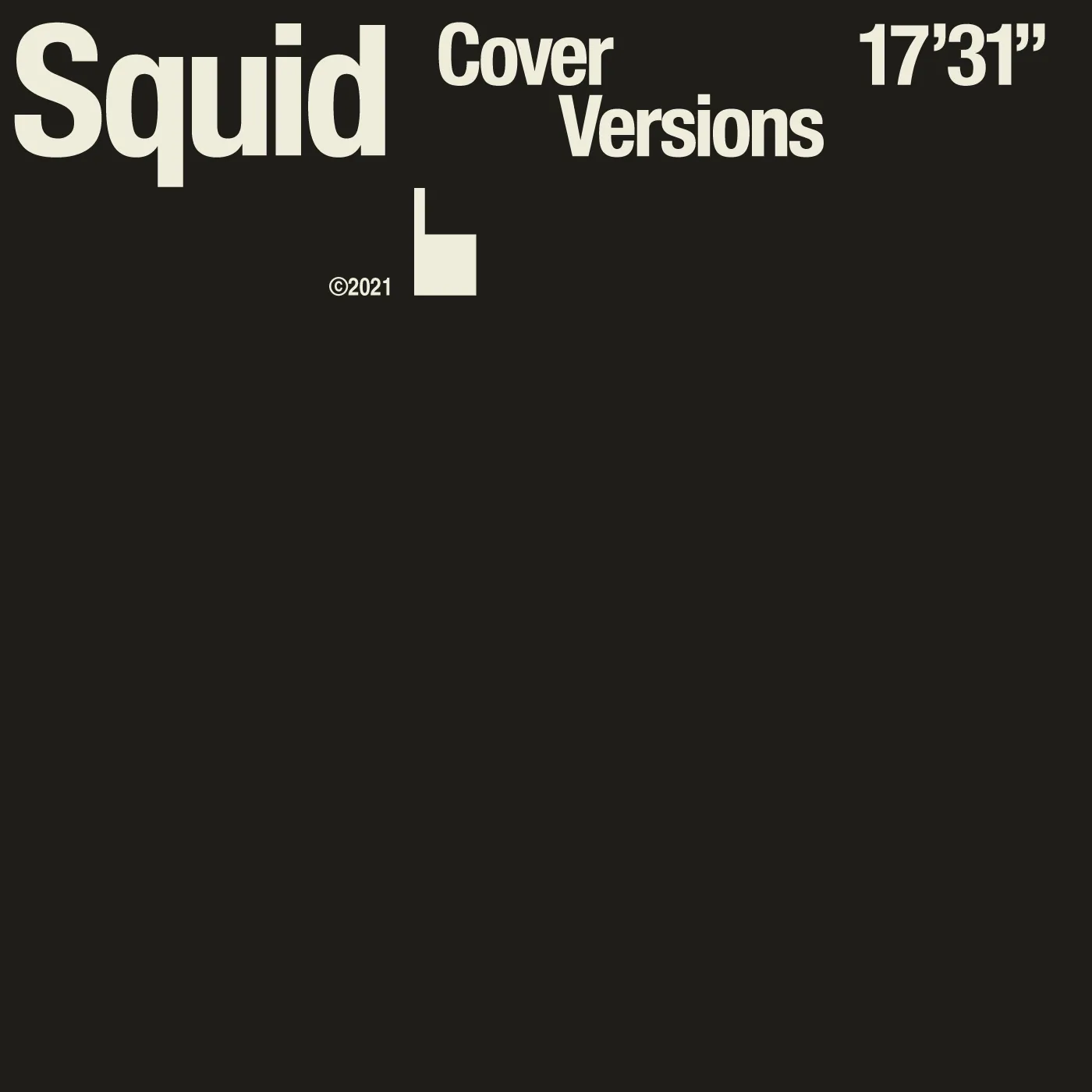
Squid - Cover Versions (Vinyl 12 - black)
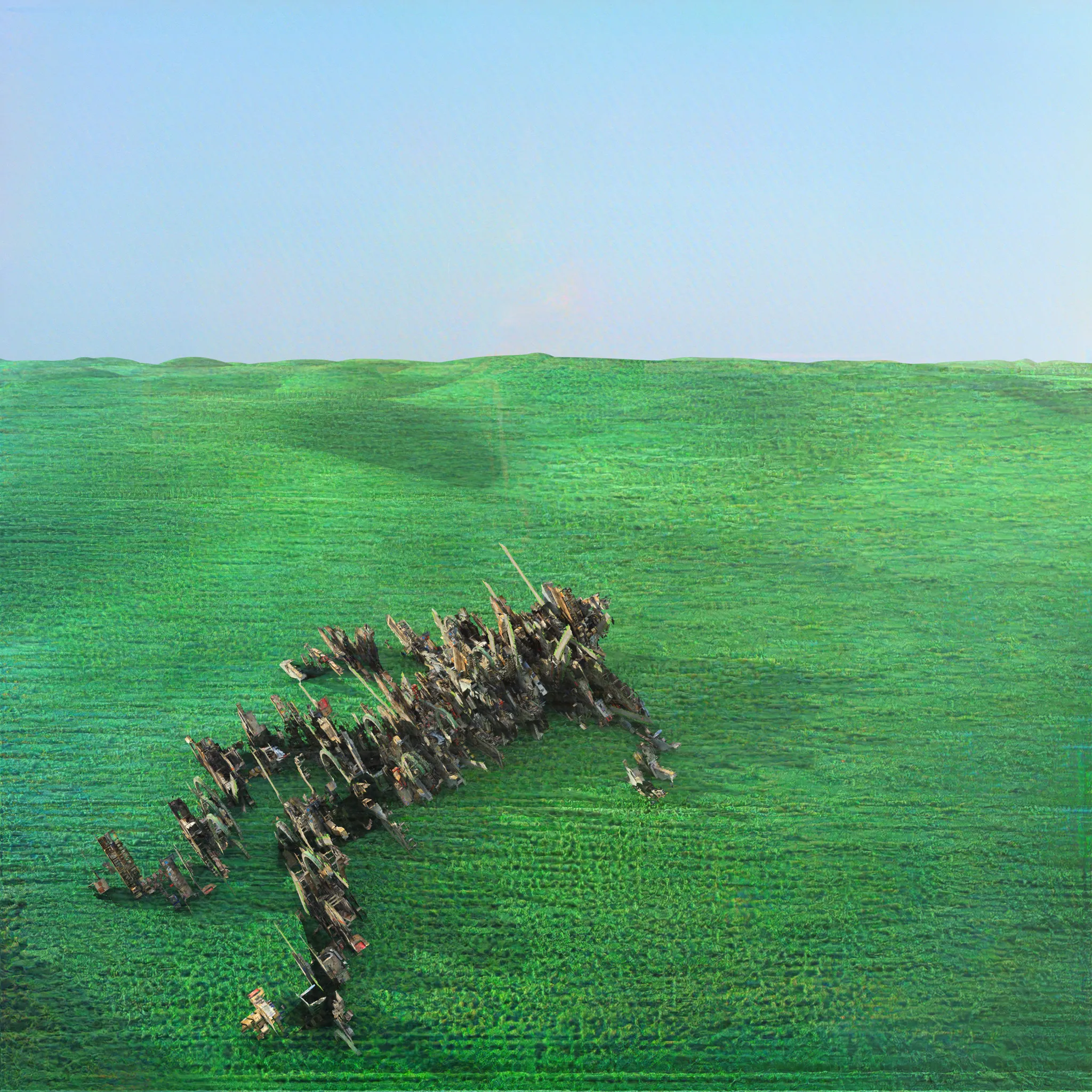
Squid - Bright Green Field (Vinyl LP - black)

Squid - Bright Green Field (Vinyl LP - green)

Squid - Bright Green Field (Cd)
As featured in the May 2023 issue of DIY, out now.
Read More
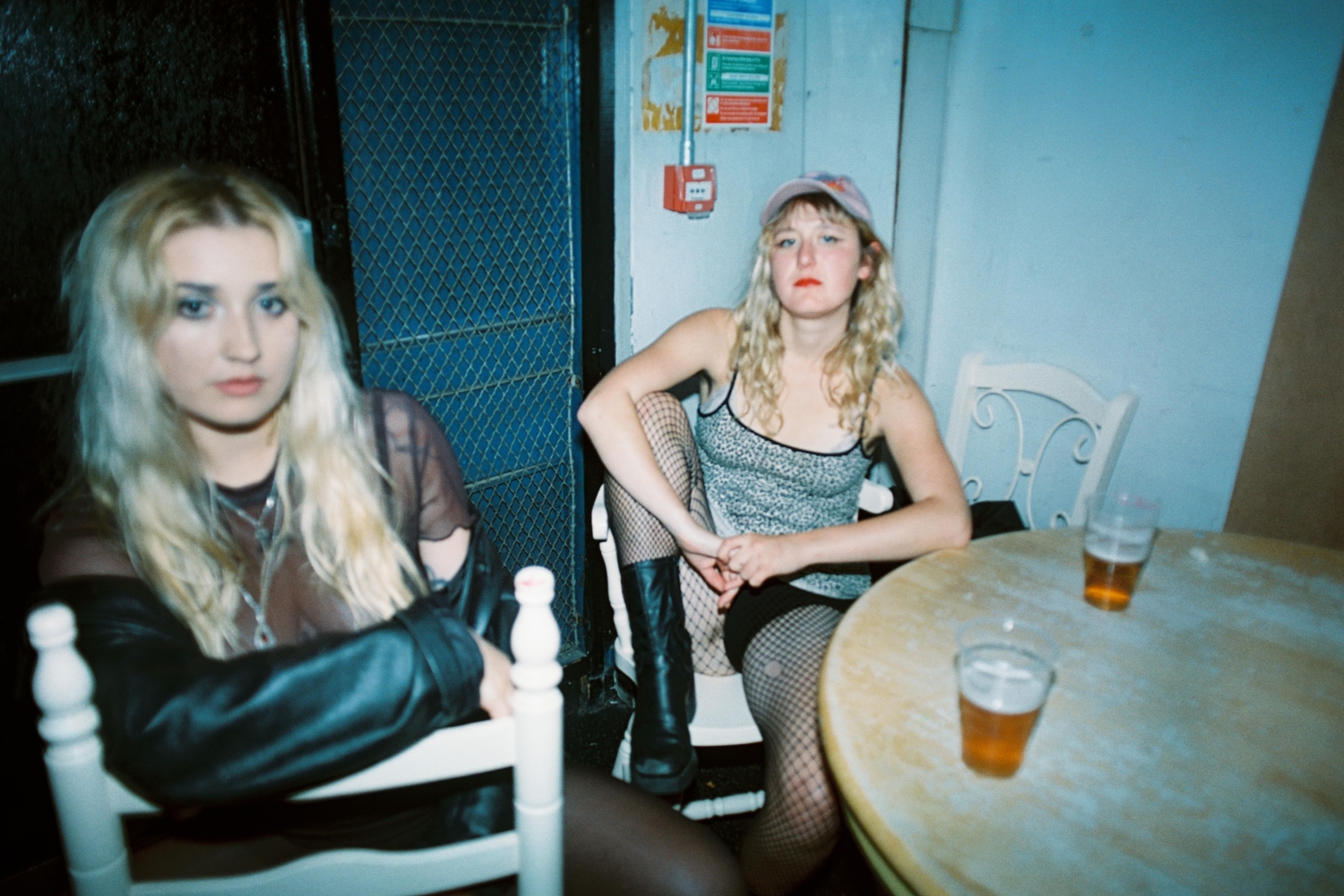
Wide Awake announce Lambrini Girls, Dry Cleaning, yeule and more
The Brixton day fest will welcome King Gizzard and the Lizard Wizard as this year's headliners.
1st February 2024, 12:18pm
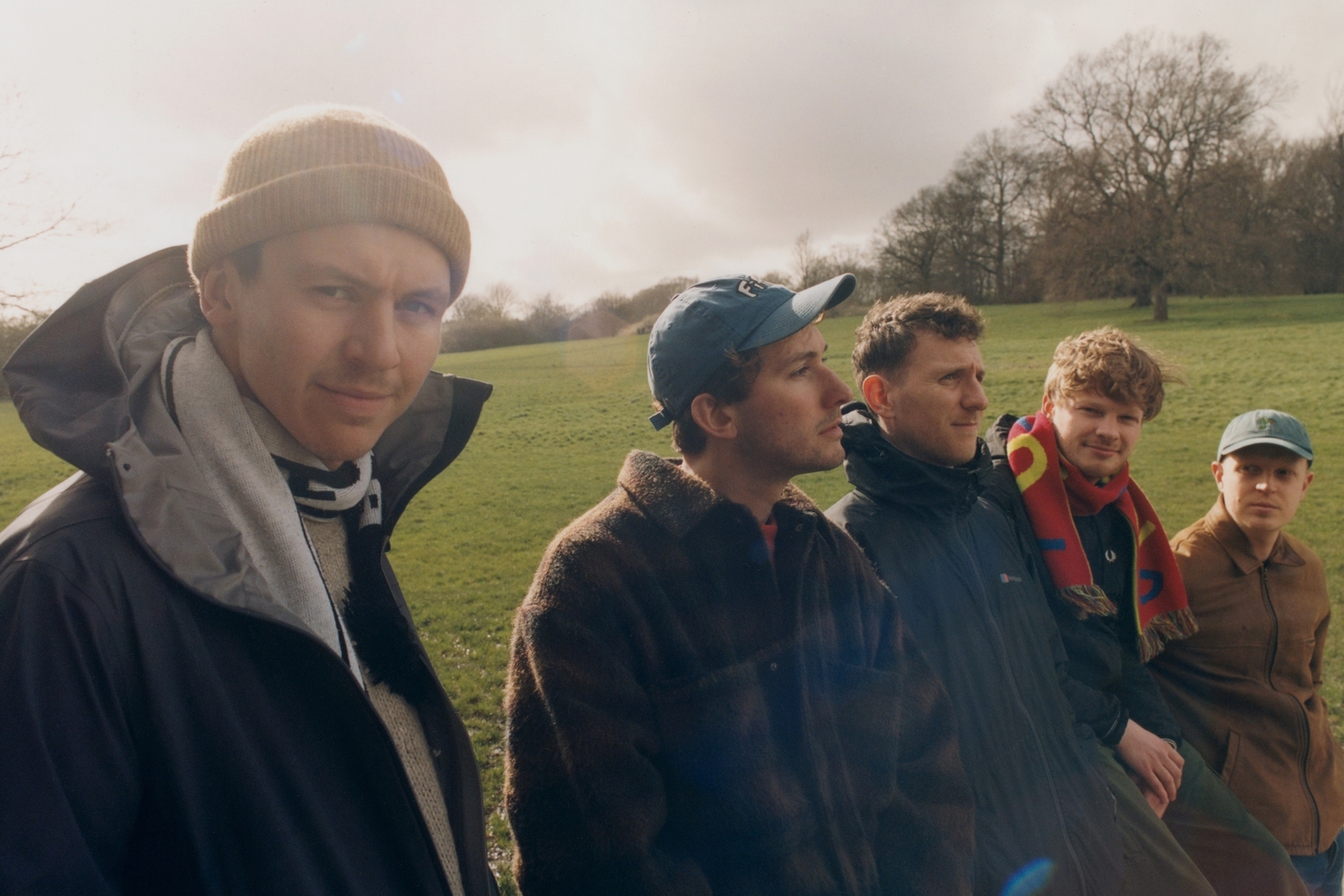
Squid offer up recorded version of live favourite ‘Fugue (Bin Song)’
24th January 2024, 3:55pm
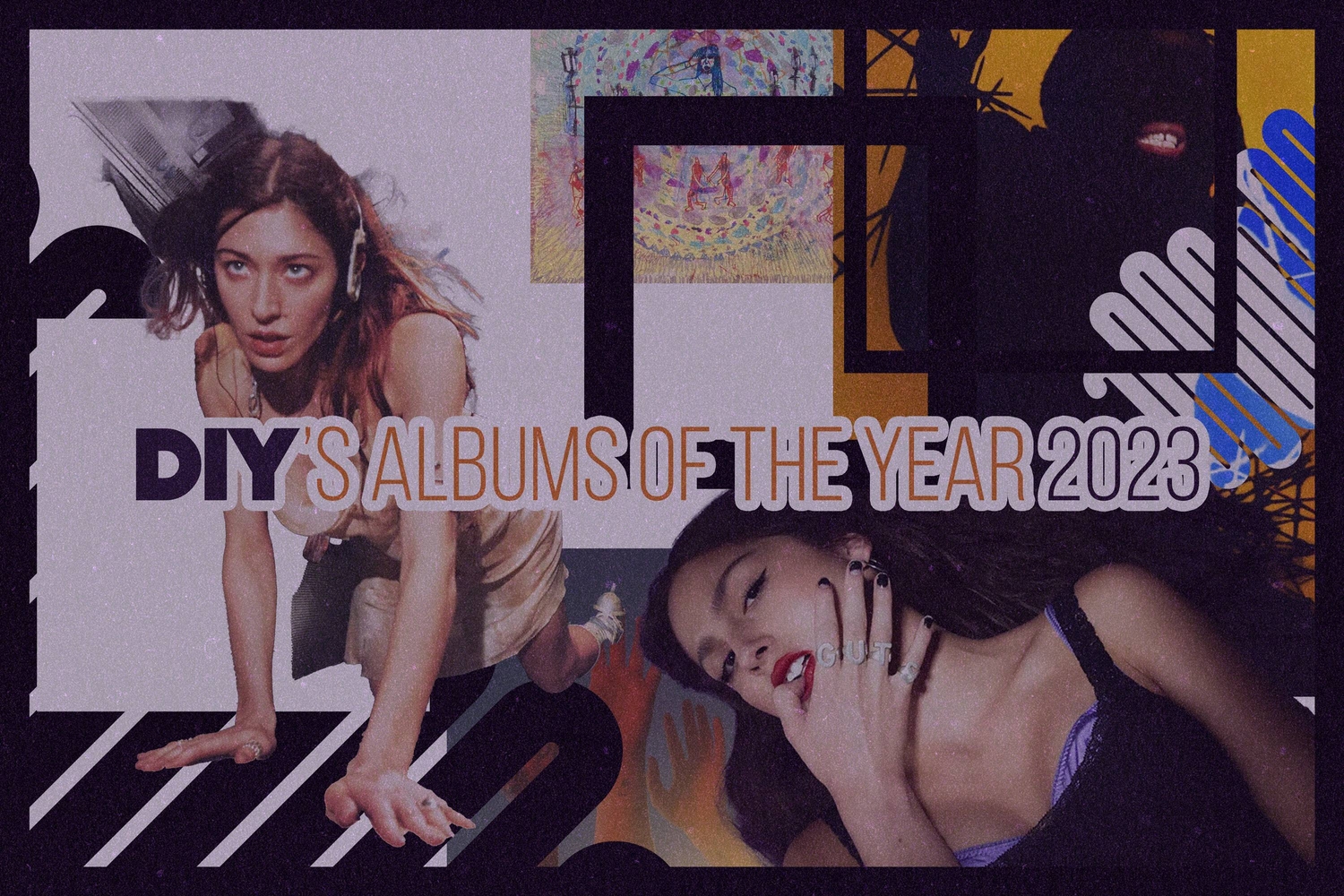
DIY’s Albums of the Year 2023
It's safe to say that it's been a stellar twelve months on the musical front, but what have DIY's writers had on repeat?
7th December 2023, 6:00pm
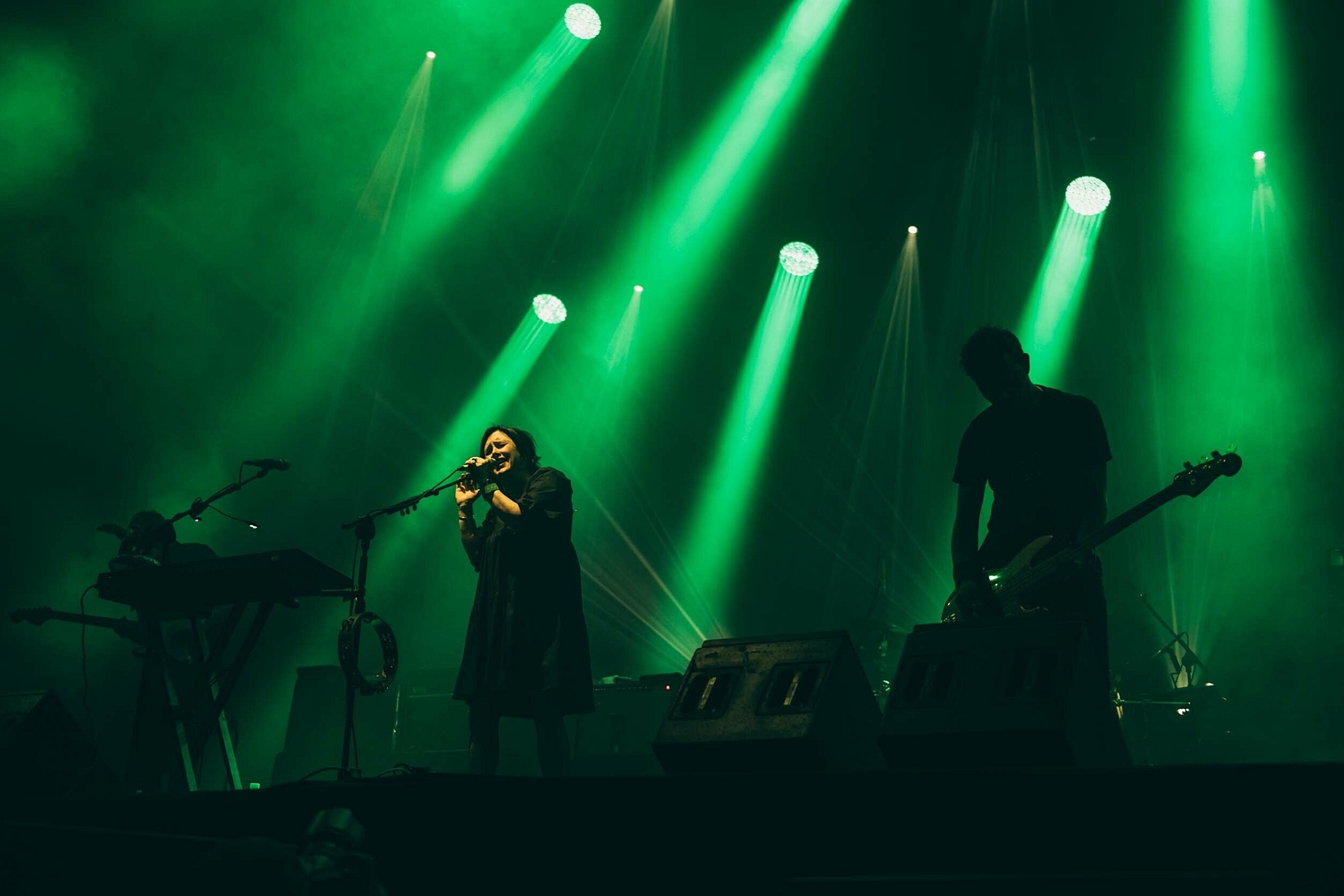
Slowdive, Sevdaliza, Modeselektor and more added to Wide Awake 2024 lineup
They'll join the previously-confirmed headliners King Gizzard & The Lizard Wizard and Young Fathers in South London next summer.
5th December 2023, 12:26pm
